“It was too hot to go fishing, or to do much of anything besides drink beer in bars”
In this edition of the Weekender: a dive bar par excellence, the madness of misophonia, and a particularly Italian shade of green
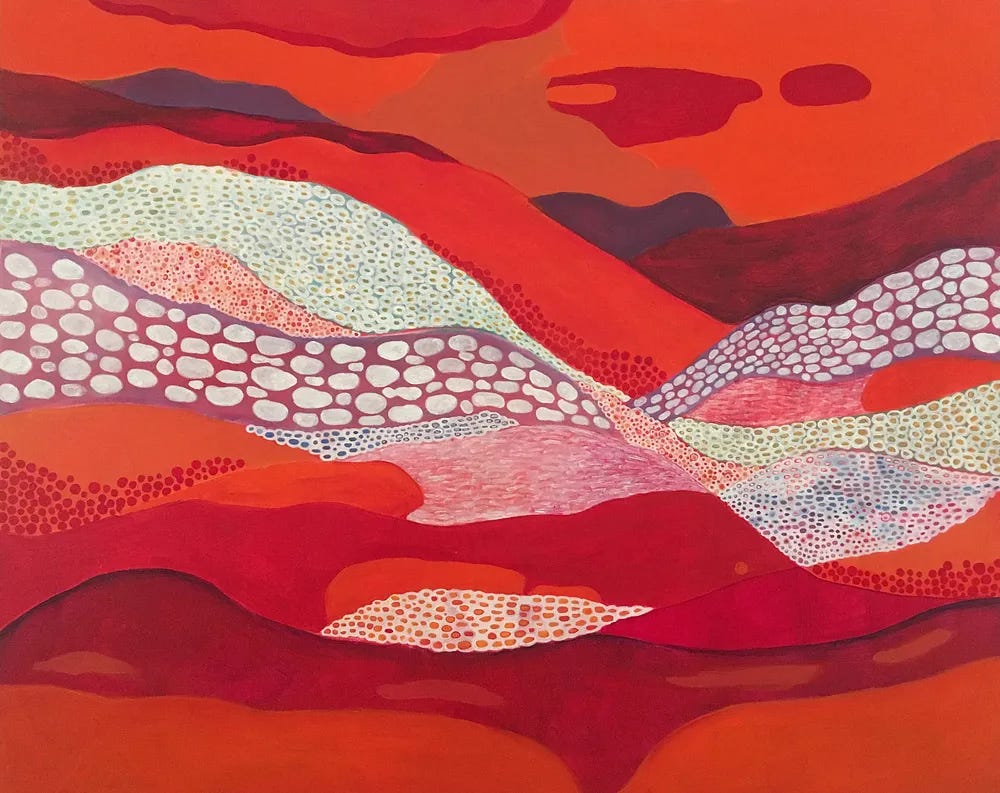
This week, we’re lingering in dive bars, saying “moist,” hiring strong men, and admiring cypresses.
TRAVEL
“Up in Northern Michigan’s Lynchian underbelly”
Meaghan Garvey visits the Pinehurst Inn, which might be the platonic ideal—or the fever dream—of a dive bar.
Scary Cool Sad Goodbye 77
—
inThis was Hemingway country—the part of Michigan where the Oak Park, Illinois, native spent his first 21 summers fishing, hunting, and drinking amongst lumberjacks, bootleggers, and Ojibwe Indians. “Absolutely the best trout fishing in the country. No exaggeration,” he wrote to a friend later of the Petoskey backlands. “It’s a great place to laze around and swim and fish when you want to. And the best place in the world to do nothing. It is beautiful country. And nobody knows about it but us.” His memories from that time would be channeled into what would become his Nick Adams stories—manly adventures in the Northern Michigan wilds starring the swashbuckling stand-in for young Hemingway himself. The woodlands near Petoskey are the setting for stories like “The Last Good Country,” where Adams and his sister abscond into the woods to live off trout and wild blackberries and evade Nick’s myriad opps. “Summer People” and “Up in Michigan” take place in nearby Horton Bay, where he did some of his best fishing on Lake Charlevoix; both stories include mention of an inn known as the Pinehurst—not the one in Indian River, but a Pinehurst nonetheless.
As it happens, I am a writer raised in Oak Park, Illinois, inclined towards backwoods Midwest adventures and, oh, let’s say intemperance. But it was too hot to go fishing, or to do much of anything besides drink beer in bars. I’d spent my second afternoon in Michigan tooling between a handful of drinking and dining establishments deemed SCSG-approved, but the Pinehurst’s siren song echoed through my mind. Tonight the music on the jukebox was the hot country hits of the ’80s and ’90s, selected by a Swedish expat who fancied himself a redneck. He seemed to have a lot to say on the subject of America, though I could barely catch the half of it through his Scandinavian accent, growing thicker by the moment as his words began to slur. From his pocket he produced a pair of knives, demonstrating their sharpness by shaving off six inches of another man’s arm hair. I was getting the impression that he’d killed a man in Sweden and had chosen Indian River as a place to disappear.
Tonight’s bartender, Kali, had a long black ponytail and two front teeth still hanging in there long after the rest had gone. She’d been at work since 9 a.m. today, and seemed to have been drinking Jack Daniel’s Tennessee Fire for approximately as long. She hailed from Northern California, where she’d dated E-40’s cousin and ran enough drugs and guns across the country to land herself in prison until sometime last year. “I’ve been sober for a year now. Off drugs, I mean,” she declared, pouring up our fourth round of Tennessee Fire shots in an hour. In the corner, the Swedish murderer was stewing as a young Jamaican man sang live renditions of his surprisingly good dancehall music. Skulking off into the parking lot, the wasted Swede reemerged ten minutes later in full Viking regalia—horned helmet, blonde wig, chainmail vest—blasting Metallica from his own portable speaker. But no one paid attention, enraptured by the Jamaican fellow’s sparkling performance, and within 15 minutes the Viking was asleep, helmet pressed against the bar.
PHOTOGRAPHY

SCIENCE
Water words
Jake Eaton examines the science behind our hatred of wet stuff, from chew-noises to the word “moist.”
The ‘Moist’ Mind Virus: Why We Hate Wet Sounds
—
inScience has been slow to understand misophonia. It took over 20 years for researchers to arrive at a consensus definition of the condition. Formally, it is now described as “a disorder of decreased tolerance to specific sounds or their associated stimuli, or cues. These cues, known as ‘triggers,’ are experienced as unpleasant or distressing and tend to evoke strong negative emotional, physiological, and behavioral responses not seen in most other people.”
The definition is intentionally vague so as to be inclusive. Partly that’s because triggers vary widely. Chewing sounds are canonical. In one study, 83% of people who identified as having misophonia reported chewing sounds as their earliest trigger. This sometimes gets further broken down into subcategories: crunching, lip-smacking, teeth-sucking, slurping. Others are more bothered by nasal sounds, or breathing, or throat clearing. (Personally I think it should include the specific sound that’s made when people knock a piece of peppermint against their teeth.) A minority get triggered by tapping or repetitive sounds.
But triggers can be hyper-specific and idiosyncratic. Scroll over to Reddit and read about people who are triggered by flip-flops, hard C and K sounds, and Southern accents. May they avoid the coastal Carolinas.
The “strong negative emotional” response is more consistent. It is almost always described as either anger or disgust, or some combination thereof. (The consensus definition also includes “irritation” and “rage,” which are of a part.) Many people report panic and anxiety, but this seems to be secondary and evaluative—more about anticipation and whether they’ll be able to handle the situation in public.
I’d always taken the co-occurrence of anger and disgust for granted. I can point to times when I felt both; the anecdote which began a longer piece on misophonia—my dad eating steak—starts with one. But the phenomenology is hard to fully pin down, and at a certain point, the words people use to describe it descend into cliche: driving me insane, etc.
The more I thought about it, though, the stranger it seemed that disgust and anger would co-occur. Both are obviously negatively valenced, but what triggers them, what they make the body do, and the neural circuitry that supports them are quite different.
ZINES
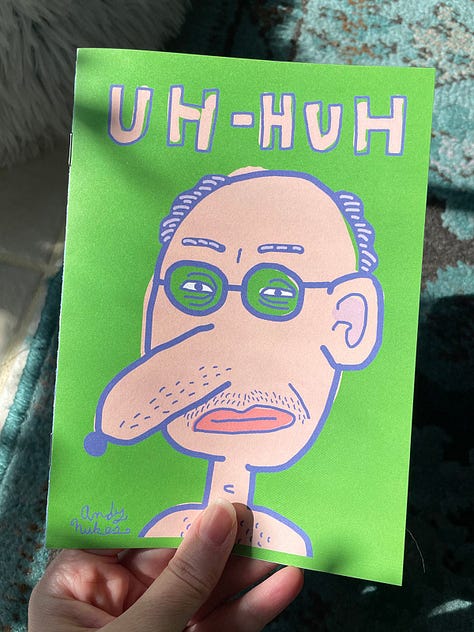

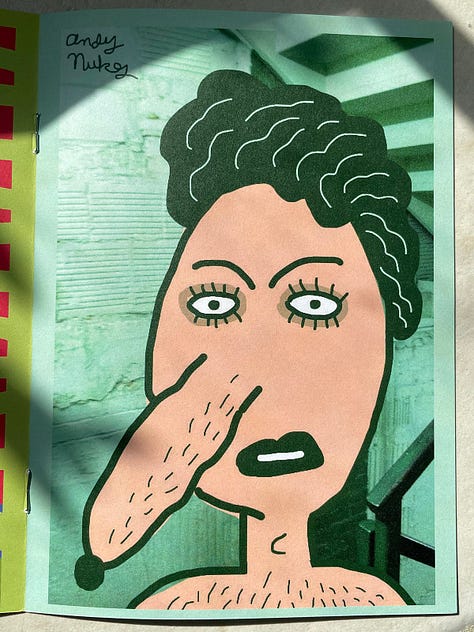

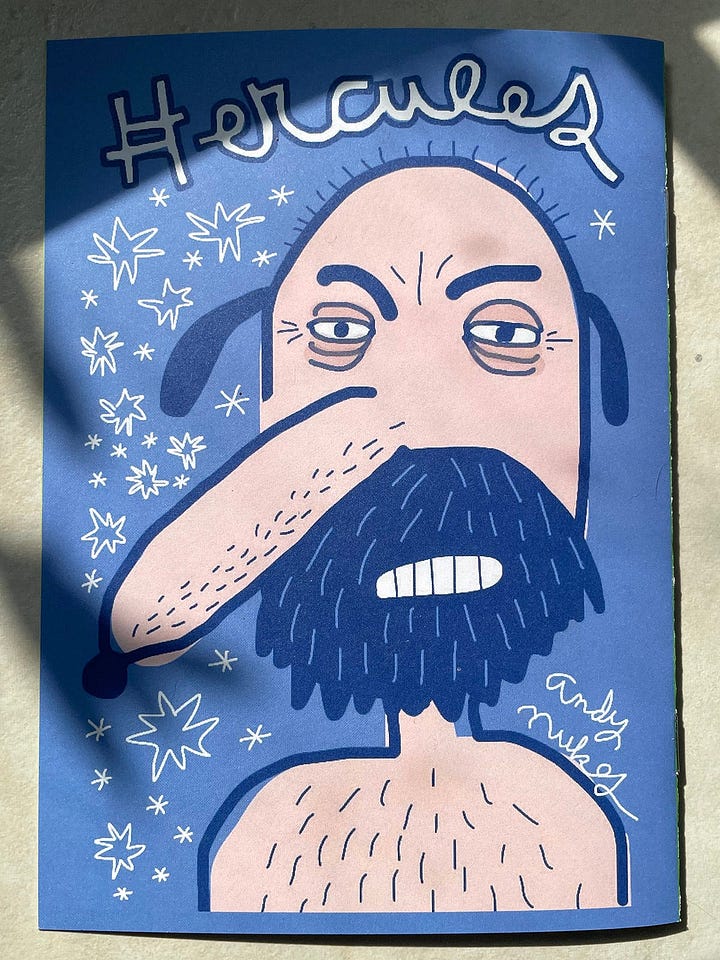
Zines by Andy Nukes, shared by his daughter, Brigitte
FASHION
Demna’s last show
This week, Balenciaga streamed its 54th couture show—Demna’s last as creative director, after eight years at the helm—live on Substack. The show was filled with references to his most significant designs and featured some familiar faces on the runway.
SMALL TALK
Odd jobs
In a discursive post about book launches, dinner parties, and acupuncture, Jess Pan considers the curious appeal of odd jobs.
Sorry I’m Late, I cannot lift heavy things
—
inRecently, we had a leak in a small closet in my flat and we had to empty it while they re-carpeted it. Then we were faced with the challenge of putting the washing machine back into the closet and putting the dryer on top of the washing machine. My husband and I are small. We cannot lift a dryer above our heads. Who can?
Kevin can. We found Kevin on an app called Taskrabbit and his skill was “lifting heavy things.” All the reviews for him said things like “this dude is really strong” and “really good at lifting heavy shit” and “Kevin can literally lift anything.”
Kevin was in our flat for about three minutes. He came in, he lifted the dryer and placed it on top of the washing machine, and he left. Sadly, my husband let him in because I was out, so I didn’t get to ask him my many questions about his profession.
“Was he a weight lifter? Former athlete? Bodybuilder?” I asked Sam.
“I didn’t ask,” he said.
“How big was he?”
“Big but not like . . . gigantic.”
“His full-time job is just lifting heavy stuff for small, weak people like us? That can’t be true . . . can it???” What must Kevin think of us?
I’ll never know. Why, why, why don’t our partners ask the right questions? I would love to sit by Kevin at a supper club. “Could you lift this table? Could you lift those two men together? Could you throw an industrial printer across a bridge?” (I wonder if Kevin tells people he works in finance to avoid these questions.)
DETAILS
THEOLOGY
“It’s not clocking to you”
A modern twist on an ancient story.
It's not clocking to you that I'm standing on business
—
inYou’re not getting it. It’s not clocking to you. It’s not clocking to you that I’m standing on business, is it. It has never been clocking to you. Not since the beginning. From the beginning of every age, it has never even clocked to you once.
In the beginning, God put His business on the earth. His business came up from the earth and watered the whole surface of the ground. Then the LORD God formed a man—a husband and a dad—to stand on the business He had made. And the man stood on business. And the LORD God clocked that he was standing on business, and He clocked that it was good.
And the man was a husband and a dad. A husband and a dad who was standing on business. A real man. A real f*cking man. And he stood on the business God had made.
And the LORD God commanded the man, “You are free to eat from any tree on the sidewalk; but you must not eat from the tree of the clocking of love and alternative agendas, for when you clock of it you will be on some weird sh*t, on some alternate agenda.”
Is it still not clocking to you שָׂטָן? I don’t care that you’re the serpent, craftier than all the wild animals. I don’t care that it looks pleasing to the eye. I am not the one. I’m really not the one.
I don’t care what kind of nasty sh*t you’re getting paid in the background to tell me, talking bout “you will certainly not die, for God clocks that when you eat from it your eyes will be opened, and you will be like God, clocking love and alternative agendas.”
Clearly you’re here for an alternate agenda, to provoke the fall of man. It’s still not clocking to you, is it. Through the obedience of one man, many will be made righteous. This isn’t love, שׂטָן, this is weird. I’m not going to just stand around here and let this happen. No sir, no way, no how.
And the man stood on business, for he was not the one. And the LORD clocked that he was not the one, and it was clocked to him as righteousness.
PAINTING
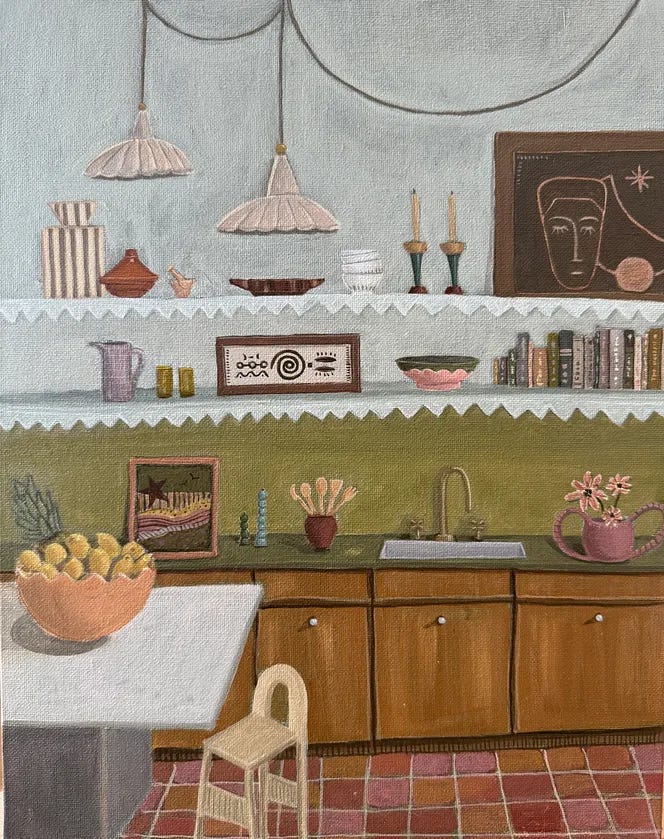
ILLUSTRATED ESSAY
Cypress green
An illustrated ode to Italy’s “elegant sentinels.”
The Colors of Assisi: Part One
—
inPOSTCARDS
What we’re watching this week
Monday, July 14, at 9 p.m. ET
of Messy Mondays will go live with of to discuss the Love Island finale, and what the show can teach us about our own romantic lives.Tuesday, July 15, at 5 p.m. ET
will interview about her NYT bestselling book Fired Up: How to Turn Your Spark Into a Flame and Come Alive at Any Age.Substackers featured in this edition
Art & Photography:
, , , ,Video & Audio:
,Writing:
, , , ,Recently launched
Inspired by the writers and creators featured in the Weekender? Starting your own Substack is just a few clicks away:
The Weekender is a weekly roundup of writing, ideas, art, audio, and video from the world of Substack. Posts are recommended by staff and readers, and curated and edited by Alex Posey out of Substack’s headquarters in San Francisco.
Got a Substack post to recommend? Tell us about it in the comments.





























That "too hot to go fishing" line feels like the start of a lost Hemingway paragraph. Meaghan Garvey's piece had me grinning; that Pinehurst scene with the Viking and the dancehall singer could’ve been pure fiction and I still would’ve bought it. Made me think of a train ride I once took through rural China, where a group of retired PLA officers were drinking baijiu and singing old marching songs well into the night.
Reminds me of a joke I heard from a golfer. "I golf in the 80s. If the temperature is above 90, I stay home and drink".